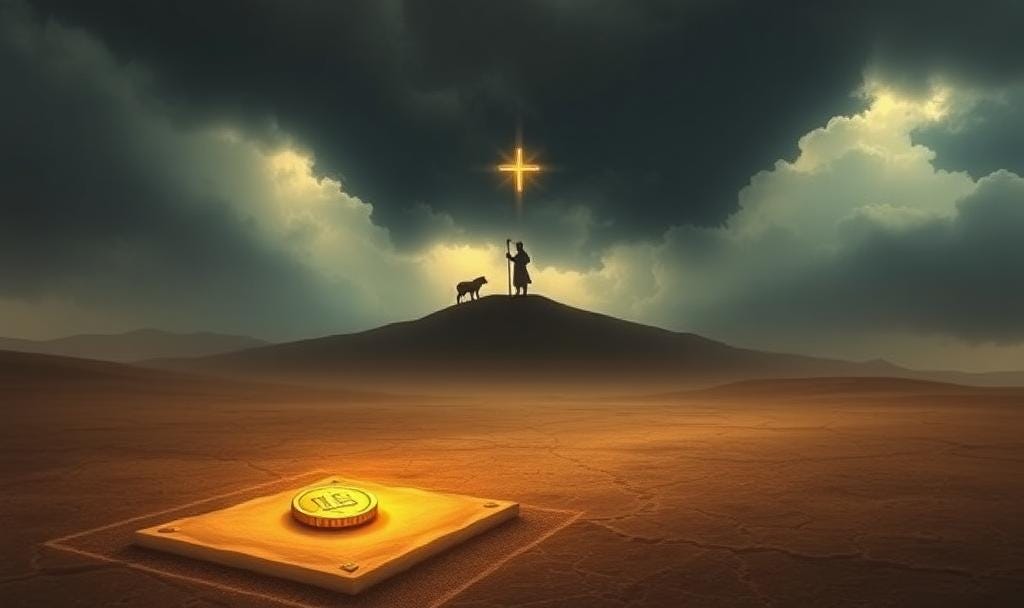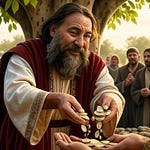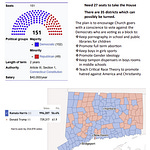
Proper 19
Psalm 51:1-11; Exodus 32:1-14; 1 Timothy 1:12-17; Luke 15:1-10
You can also subscribe to this podcast on Apple, Spotify, or YouTube.
I.
Last week, we witnessed the most high-profile political assassination in this country since June 5, 1968, when Robert F. Kennedy was gunned down in Los Angeles.
For those of you over 40—I am 52—you need to understand something: what happened at Utah Valley University on Wednesday, September 10, is the younger generation’s RFK and Kent State moments combined.
This is the defining political moment for a new generation and, I believe, signals the end of the Baby Boomers’ long cultural ascendancy.
My own generation, Gen X, will never enjoy such ascendancy, but we have ridden the coattails of our older Boomer siblings and parents for most of our lives. No more.
Our children are young and coming of age. They are being gunned down in plain sight. Charlie Kirk was 31.
Charlie Kirk spoke out against the world the previous generations left him—not because he hated them or blamed them—but because we never found the collective will to stop this cultural destruction, to end the moral liquidation of our society. So, it fell to Kirk and his legions of campus followers to try.
No more. Now, Charlie’s blood cries out—cries out for vengeance, yes—but let God and the State of Utah take care of that.
Charlie’s blood cries out for Boomers to let go, for my own Gen X to shake off our apathy and truly care about something for once, and for Millennials and Gen Z to finish Charlie’s work, drain the sin-infested swamp, and bring about lasting reform in the name of Jesus Christ. All of us now share this burden, and this morning we must reclaim our resolve to work together.
This is our present cultural context. This is what we face. What do today’s readings have to say about it?
II.
Today’s readings from Exodus and Luke speak about the covenant between God and Israel.
Upon their miraculous deliverance from slavery in Egypt, the Hebrews “rose up to play”—the image here is sexual, orgiastic—and “corrupted themselves” through idolatrous worship of a molten calf. In today’s Gospel, Jesus finds “tax collectors and sinners” drawing near to hear Him.
In Exodus, Moses invokes the covenant to save his people, urging God to repent. In the Gospel, Jesus shows that God is free to act outside the covenant, saving whomever He wills.
Like the Israelites who sacrificed to the golden calf, Jesus is accused of corrupting Himself. “This man receives sinners and eats with them,” the Pharisees say.
Eating with the sinfully impure made one ritually impure, unable to offer sacrifice in the temple.
Think of sin like an arrow—or the bullet that killed Charlie—which, once released, cannot be stopped until it finds its mark and kills. In the Jewish mind of Jesus’ day, sin was to be avoided at all costs. It could—and still can—strike you dead.
To the Pharisees’ grumbling, Jesus replies that there is more to the covenant than legal compliance. A change of heart is needed.
So valuable is the sinner’s changed heart that it is like the housewife who finds a lost coin or the shepherd who leaves his flock to find a lost sheep, knowing it has turned around but doesn’t know the way home.
Repentance—meaning nothing more than the sinner’s sorrow and desire for change—is enough for Jesus to say the covenant’s legal demands are met. No more is required.
“I have found my sheep which was lost.”
“I have found the coin which I had lost.”
The sheep and coin symbolize the lost heart of the human race. When that heart turns back to God—as it does in Christ—there is much rejoicing in heaven.
The Pharisees thought otherwise. They believed the external application of the covenant was enough.
After all, it worked for Moses: “Turn from thy fierce wrath, and repent of this evil against thy people. Remember Abraham, Isaac, and Israel, thy servants, to whom thou didst swear by thine own self, and didst say to them, ‘I will multiply your descendants as the stars of heaven, and all this land that I have promised I will give to your descendants, and they shall inherit it forever.’”
Merely invoking the names of the covenant patriarchs—Abraham, Isaac, and Jacob—was enough. It seemed to work like magic to get God to change His mind. Exodus 32:14 says, “And the Lord repented of the evil which he thought to do to his people.”
But it’s not God who needs to change. We do. He’s not lost. We are.
III.
The demoralization of a generation begins in its youth.
“And [Aaron] received the gold at their hand, and fashioned it with a graving tool, and made a molten calf; and they said, ‘These are your gods, O Israel, who brought you up out of the land of Egypt!’” But it was a lie. These were not Israel’s gods. God was Israel’s God.
One lie begat another, and the demoralization of the Exodus generation continued. “When Aaron saw this, he built an altar before it; and Aaron made proclamation and said, ‘Tomorrow shall be a feast to the LORD’”—literally to Jehovah, God by His proper name.
But God is not worshiped through images, and to call on the name of Baal is to explicitly reject calling on the name of the LORD. One does not call on Baal and Jehovah, Krishna and Christ, Buddha and Jesus. “Hear, O Israel: The LORD our God is one LORD.”
For the Exodus generation, freed from slavery in Egypt, repentance wasn’t necessary. Gratitude would have been enough.
But they were corrupted, demoralized, it seems, on purpose by Aaron, their leader, the weak pastor, who, instead of challenging his flock, appeased them, saying, “You may have your molten calf. You may have your love feast and public orgy, but we will do it in the LORD’s name.”
This is legalism of the grossest kind, so obvious that we see Aaron was rationalizing. He was rationalizing both Israelite apostasy and his own failure of nerve. For this, God meant to strike him—and the Exodus generation—dead.
“Now therefore let me alone, that my wrath may burn hot against them and I may consume them,” God says to Moses.
But He does not strike them dead, not all at once, though their demoralization is complete.
The Exodus generation becomes the wilderness generation, condemned to wander forty years until they die out, never to enter the Promised Land.
Yet, Scripture tells us, “the Lord repented of the evil which he thought to do to his people.”
The lost generation will never find its way home, but in this passage from the thirty-second chapter of Exodus, the trumpet of the gospel can be heard, faint at first, like a faraway camp bugle at dawn, its sound growing clearer and sharper as the centuries grow long, when the sun finally sets on the old world, and herald angels sing the coming of the new.
“The Lord repented of the evil which he thought to do to his people.”
IV.
This is the most difficult part of this passage. God changing His mind is not possible. James 1:17 describes God as “the Father of lights with whom there is no variation or shadow due to change,” so God cannot possibly “repent.” Two things must be said about this.
First, “repent,” while not a mistranslation, conveys the wrong meaning to us. To repent means to experience sorrow and desire for change.
Second, to make sense of this passage, we need to shift our perspective. When God repents, He feels sorrow and a desire for change. When the sinner repents, he also feels sorrow and a desire for change.
The shift occurs as we move from God’s perspective, who always feels sorrow at the sins of the human race and desires for us to change, to ours, who, like the demoralized Exodus generation, can never feel sorrow for our sins nor a desire to change our lives, unless and until God seeks us first.
That is the meaning of the parables Jesus tells in Luke’s Gospel today. A formal, legalistic religion cannot save you. Reciting the covenant names of Abraham, Isaac, and Jacob has no effect. It did not save the wilderness generation. That generation remained lost and demoralized. It never entered the Promised Land.
But we can enter the promised land of the life of the world to come through Jesus Christ, who both seeks us and allows Himself to be found by us. We are both the shepherd seeking the lost sheep and the lost sheep. We are the woman and the lost coin she finds.
Christ seeks us as the true and good Shepherd of our souls. He suffers a demoralizing defeat on the cross. He takes on the guilt and shame of all man’s lost generations.
He is briefly lost to us in death so that we may find Him once again, risen from the tomb. When a sinner finds this risen Christ, the sorrow of earth is raised up to become the joy of heaven.
Jesus says, “There will be more joy in heaven over one sinner who repents than over ninety-nine righteous persons who need no repentance.” The Pharisees prided themselves on needing no repentance, which means they did not need God, for even God repents.
Even God knows the sorrow of the human heart and desires to change that heart. The Pharisees knew no such desire, and their religion has never changed a single heart.
V.
Now, to every lost generation since the fall of man, I say to you seek Him and you will surely find Him.
Specifically, to the four lost and wandering generations among us, Boomers, Xers, Millennials, and Zoomers, I say this: God seeks you and there will be much rejoicing in heaven when you turn to Him.
Boomers: yours was a generation born to parents delivered from depression and war. Yet you rose up to play, seeking the images of eastern religion or the demon Indian spirits native to this land. Repent. Return to the living God. Do not continue to mix your worship of God with idols as Aaron did.
Gen Xers: you grew up on the Boomers’ hand-me-downs, both their clothes and their reruns on TV. You were taught by Star Wars that God was an indifferent “force”—not a personal Lord that you must take seriously, to whom you owe obedience.
You were also the first generation to be aborted in large numbers. Your numbers are not what they should be and now it is time for you to find your voice and speak for those of your cohort who never drew their first breath.
Look not to your older Boomer siblings and parents, but to your children and coming grandchildren. Some of them, like Charlie Kirk, have already become martyrs to the Christian cause, a cause you now need to start taking seriously. Our apathy no longer becomes us. It never did. Put on a coat and tie and get serious.
Millennials: to the slaughter of abortion was added the slaughter of Columbine, and every school shooting since. You fought the endless wars in Afghanistan and Iraq. To this day you deal with the moral injury wrought by governments and employers who care nothing for the truth, yet expect you to work harder for lies and even harder for less.
You were taught to love the lie—and many of you do. Reject the rainbow and its lies. Remember that it was first the sign of the covenant of peace between God and men after the flood. Yet you fly this flag with pride and provoke God to His face. Repent.
Finally, to the Zoomers: Charlie belonged to you. He was one of your own. He saw that we were at a turning point in this country, and his assassination may very well mean we’ve reached the tipping point.
Your generation has never known a society in which the public trust is held sacred because every institution in it—law, education, medicine, and church—has betrayed your trust. You were masked, kept home from school, and made the guinea pigs of a social and biological experiment cooked up by “experts” from the three generations preceding yours. To you I say: “We are sorry. We repent.”
But you also must repent. That is, you must feel sorrow for the sins of your forefathers and desire change. You are the fourth generation. The sins of the fathers—the sins that were visited upon you—must stop with you.
This means that you must smother the saplings of sin that already grow in your hearts. Do not succumb to the Evil One who has already transitioned so many of you to his side. Resist the Devil and he will flee.
Those of us in every generation who came before you, those of us who see what must be done, we will stand with you, but the reconquista belongs to you.
There are things we can do to help you. For instance, 30% of Christians do not vote. We need to get them registered. We need to get them voting.
Last Wednesday, at the invitation of State Senator Henri Martin, I gave the invocation at the GOP’s Build A Better Connecticut meeting. For the first time in living memory, house and senate GOP leaders are working together.
Specifically, they are coming together to canvass every town in this state. But there are 34 towns where the Democrat candidate ran uncontested. Why is that? Because there are not enough people willing to run. Because 30% of Christians are not voting.
Because, unfortunately, at least as far as I can tell, Republican Party leadership in this state prefers to sit out so-called “unwinnable” races. Don’t ask. It has something to do with campaign finance law. But I say that’s like expecting to win the World Series without ever hitting singles, or to win the Super Bowl without ever making a first down.
Now, before you accuse me of being partisan—which admittedly I am and I don’t try to hide it—let me say this: If the GOP won’t run candidates, perhaps the Church should.
Christian Gen Xers and Millennials: don’t run from politics. Charlie Kirk wouldn’t have wanted that. It’s no accident that Kirk is the Scottish word for Church. Instead, run for political office. You see, it isn’t enough, as we learned in today’s Gospel, to always be among the 99 who do not need to repent.
Sometimes I’m criticized for being too focused on sin in the pulpit, as if I think you’re all up to no good. It’s not that. I’m not worried about that. You’re good, Christian folk. I know that. You know that. So, you wonder: “What gives? Why is he going on like this?”
Because it’s not enough. It’s not enough that you don’t need to repent. That’s exactly what the Pharisees thought. That’s pharisaical thinking. “This man receives sinners and eats with them. Well, we would never do that!” That’s legalistic thinking.
Jesus shows us the need to lament, the need to grieve for sin—not just our own, but the public grievous sins that our nation commits every day. You need to desire change, because the heart of God grieves and desires change as well. You need to “be the change.”
The words of the King James Bible, of the apocryphal book Ecclesiasticus, also called Sirach, the forty-fourth chapter read:
“Let us now praise famous men, and our fathers that begat us.
The Lord hath wrought great glory by them through his great power from the beginning.
Such as did bear rule in their kingdoms, men renowned for their power, giving counsel by their understanding, and declaring prophecies:
Leaders of the people by their counsels, and by their knowledge of learning meet for the people, wise and eloquent are their instructions:
Such as found out musical tunes, and recited verses in writing:
Rich men furnished with ability, living peaceably in their habitations:
All these were honoured in their generations, and were the glory of their times.”
There is glory left in our time and in the times to come. Men like Charlie Kirk beheld that glory, full of grace and truth. He has won his crown.
May your generation go on to win many more—crowns which now lie in the gutter—cast off by so many who went before you. Crowns of knowledge, wisdom, love, and purpose; of learning and piety, of manly and womanly virtues; of true religion, civic governance, science, and industry.
And may all of us come to know the sorrow of the beating, repenting heart of Christ, the “man of sorrows, and acquainted with grief”—for this was always God’s purpose and plan: to meet us in that place of loss, to find us, and to rejoice when we are brought home to heaven.
Preached on September 14, 2025, at the First Congregational Church, Woodbury, Connecticut.











